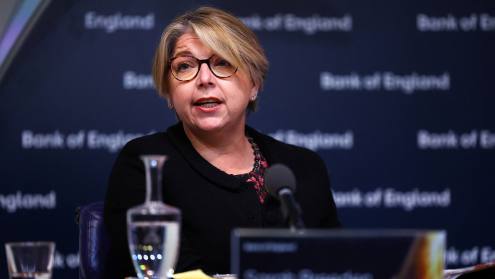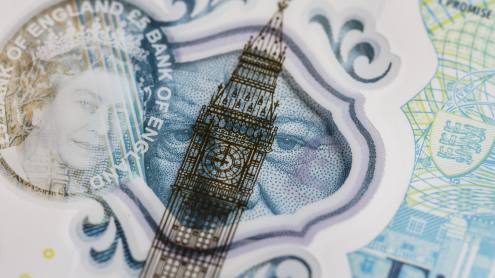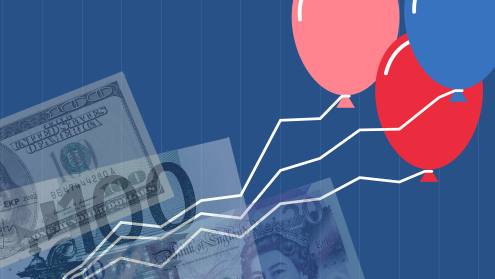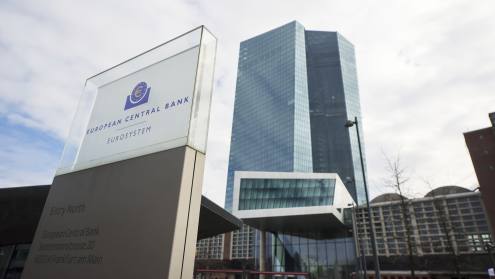As Nigerians digest the implications of the latest major devaluation of the naira, bankers’ thoughts may well turn to the currency’s last major drop of 2016. In the midst of a bearish oil market, falling dollar reserves forced the Central Bank of Nigeria (CBN) to abandon its support of the naira in July 2016, prompting the currency to lose 30% of its value overnight.
While banks that had built up large net asset positions in foreign currencies ended up benefiting from the revaluation, lenders with large foreign currency loans were hit hard.
“Banks took huge losses in the loan portfolio due to the naira devaluation of 2016, as a lot of forex [foreign exchange] loans had been given to companies with receivables in naira only,” says Ada Ufomadu, senior head of financial institutions at GCR Ratings in Lagos. “This led to a lot of defaults because with the devaluation, naira receivables became insufficient to settle forex obligations.”
Six years on, and the currency has hit a new low against the dollar. The country’s new administration – sworn in in late May – has moved to end a long-standing complex forex management programme, which had seen shortages of foreign currencies and a plethora of different rates for different sectors, creating significant arbitrage opportunities for those with access to foreign currency.
Following the removal from office (and subsequent detention) of CBN governor Godwin Emefiele – the primary architect of the programme – on June 9, the bank allowed the naira to trade freely, prompting a 23% fall in the currency’s official value and around 40% on the parallel market, the Financial Times reported, making it the biggest one-day fall in the currency’s history.
A long time coming
The removal of support for the naira, which has significantly narrowed the gap between official and parallel market rates, had long been called for by local and international investors as a means of attracting foreign currency inflows, both from remittances and from foreign investment.
Yet the speed of the move, less than three weeks after the inauguration of president Bola Tinubu, took many by surprise.
“Mr Tinubu in his inauguration speech shocked people when he announced the end of the subsidy on fuel [worth nearly $1bn a month], which was one of the biggest challenges facing the government on the fiscal side,” says Tunde Leye, a partner at Lagos-based SBM Intelligence.
“This made it inevitable that he would then tackle the foreign exchange programme and the arbitrage it enabled, which has been the main challenge on the monetary side.”
banks have learned that it makes sense to maintain a net forex asset position at all times
Despite the abrupt change in the forex programme, not to mention the sudden removal of the CBN governor, the impact of the fresh devaluation is set to be far more benign this time around.
“The 2016 crisis saw the central bank put in stricter risk management frameworks for banks, who in turn have learned that it makes sense to maintain a net forex asset position at all times,” says Ms Ufomadu. “Therefore, even if there is a further devaluation, banks won’t be affected as much as was the case then.”
With lessons having been learned from the 2016 crisis, banks are seen as being among the largest beneficiaries of an overhaul of the foreign exchange market this time around.
“The devaluation will have a positive impact on bank balance sheets, with assets expected to inflate by as much as 15% on the exchange rate difference alone,” said Joshua Odebisi and Titilayo Lawani, analysts at RMB Nigeria Stockbrokers, in a June research note.
Several banks were approached for comment for this article.
Wait and see
Banking stocks in Nigeria have been on a tear since Mr Emefiele’s suspension, rising 23% in June, the highest monthly increase in five years. At time of writing, the country’s NGX All Share Index was trading at close to its highest level since 2008.
Yet the rally in shares remains a locally driven phenomenon, with foreign investors biding their time before dipping their toes in Nigerian waters once more.
“If you are a dollar investor, you will have to digest the naira weakness,” Malcolm Dorson, portfolio manager at Global X Management, told Bloomberg. “You need to have a strong level of comfort with the government that these reforms will be sustained going forward.”
Indeed, while local businesses have welcomed the recent devaluation, there are no illusions about the work that needs to be done before foreign flows return in earnest.
Read more on Nigeria
“It’s definitely a step in the right direction because investors will now be able to effectively repatriate dollars out of the country,” says Tosin Eniolorunda, founder and CEO of fintech Moniepoint, which came second in the Financial Times/Statista fastest-growing African companies ranking for 2023.
“What’s needed now is a greater supply of foreign currency, so that the naira can stabilise at a particular price point, and investors can plan for the longer term, because rates are still a little volatile now.”
While the CBN clarified in late June that it planned a “managed” free float for the naira, it has yet to intervene to support the currency’s value.
“Right now we’re at a stage where the CBN is still trying to gauge where the forex market will settle in terms of exchange rates,” says Ms Ufomadu. “When it has greater clarity, the regulator may then set a target range for exchange rates at the Investors and Exporters window.”
The CBN did not respond to requests for comment.
Taking back control
While Mr Emefiele’s swift removal and subsequent detention took many by surprise, his tenure as CBN governor was widely seen as coming to a close, with the end of his second term due in May 2024.
the CBN will have to raise rates by at least 700 basis points before the end of the year to reassert control over prices
Folashodun Shonubi, a former CBN deputy governor, was appointed as acting governor in June. A new governor is expected to be appointed at the formal end of Mr Emefiele’s term, given that a move to make a more permanent appointment before then would require senate approval.
Wale Edun has emerged as the favourite to be the new governor. Mr Edun, who served as Mr Tinubu’s financial commissioner during his time as governor of Lagos, was appointed as a presidential advisor on monetary policy in June. He has also worked for banks including Chase Merchant Bank and at Chapel Hill Denham Group, a prominent Nigerian investment bank.
The scale of the challenges facing the new governor should not be underestimated. Inflation surged to a 17-year high of 22.4% in May, with Capital Economics forecasting the impact of higher fuel prices to drive inflation to more than 30% for June.
Bank of America forecasts that the CBN will have to raise rates by at least 700 basis points before the end of the year to reassert control over prices.













